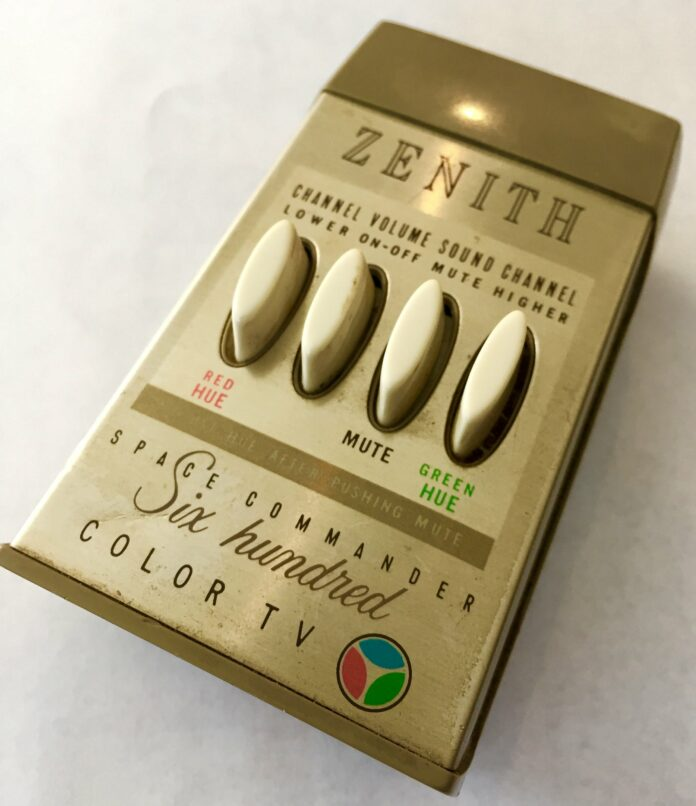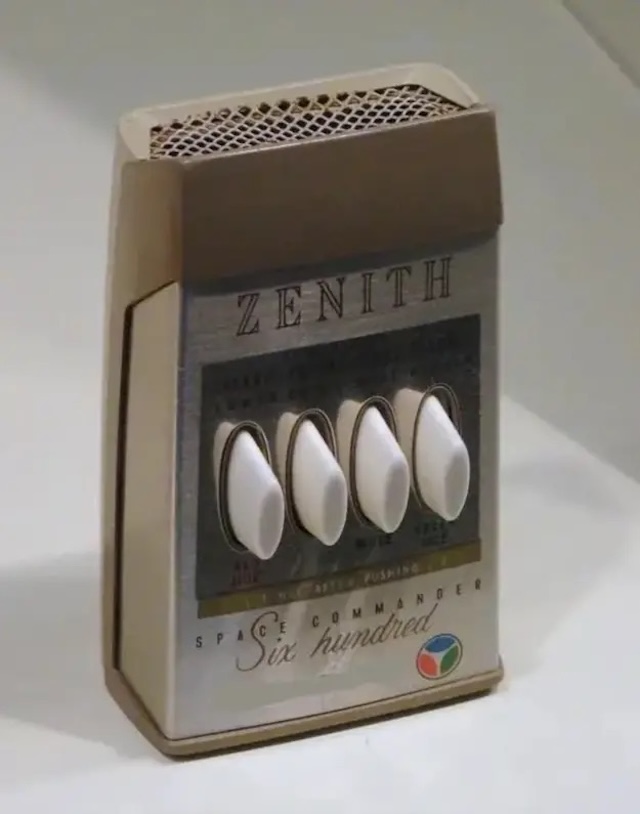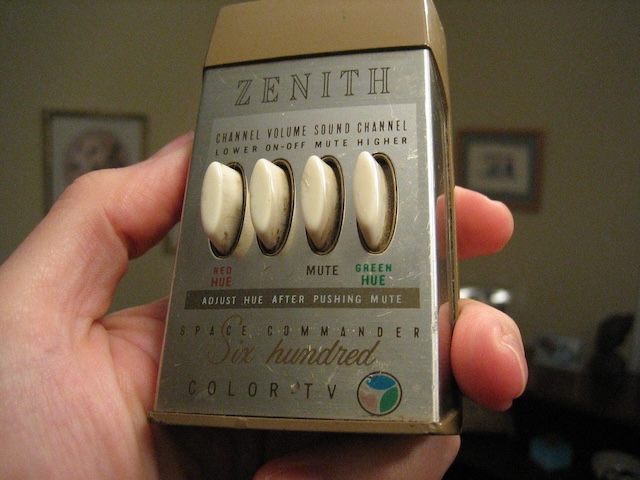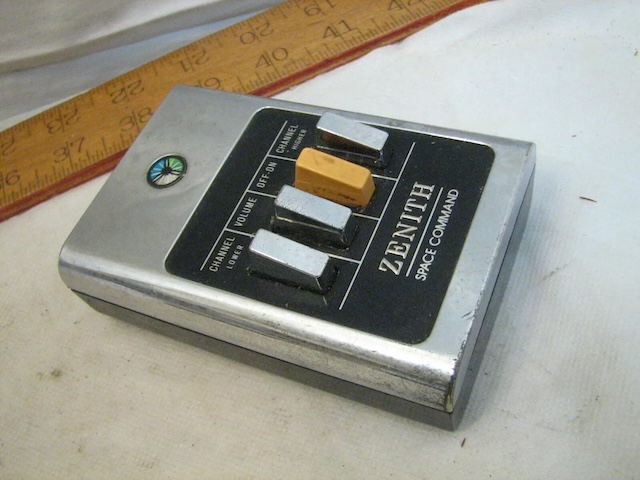Long before smart devices dominated living rooms, simple yet groundbreaking gadgets redefined convenience. One of the most iconic of these innovations was the Zenith Space Commander Six Hundred remote control. Launched in the 1950s, this vintage remote wasn’t just another electronic accessory—it marked a turning point in how people interacted with their televisions. Let’s travel back to an era when this device was the height of modern convenience and explore its story.
The Birth of a Television Revolution

The 1950s were a time of rapid growth and change in American households. As televisions became more common, one problem persisted—adjusting the channels, volume, or power required getting off the couch. It might seem trivial today, but back then, it was a daily inconvenience. Zenith Electronics, led by Dr. Robert Adler, sought to change that with a groundbreaking invention: the Space Commander Six Hundred. It was an early attempt to make TV viewing more seamless, giving users control at the touch of a button.
The Ingenious Design of the Space Commander Six Hundred
What made the Space Commander Six Hundred unique wasn’t just its functionality but also its innovative design. Unlike modern remotes that use infrared signals, this vintage device operated through ultrasonic sound waves. It had four basic buttons—On/Off, Channel Up, Volume Up, and Volume Down—each triggering a metal chime inside to emit a distinct frequency. These sounds, inaudible to human ears, were detected by the TV receiver, allowing users to control the set from afar.
This remote didn’t require batteries, which set it apart from later models. Instead, it relied on mechanical energy to produce ultrasonic sounds, making it both eco-friendly and maintenance-free. The device was built with durable materials, ensuring it could withstand the test of time—literally.
How the Space Commander Became a Household Staple
The Zenith Space Commander Six Hundred quickly became a must-have gadget in American homes. It brought a level of convenience that was unheard of at the time. Viewers no longer had to leave their cozy chairs to switch channels or adjust the volume. With this remote, changing the channel became as simple as pressing a button—a luxury that modern audiences might take for granted but was revolutionary back then.
Families marveled at how it changed their TV experience, fostering the rise of “channel surfing” and the habit of flipping channels during commercial breaks. The remote soon became the coveted “power seat” of the living room, often sparking playful disputes over who got to hold it.
Ultrasonic Technology: A Fascinating Mechanism
The Space Commander’s use of ultrasonic technology was both a marvel and a quirk. Each button on the remote triggered a small hammer inside, which struck a metal rod to produce a specific ultrasonic frequency. TVs were designed to recognize these frequencies, translating them into commands.
However, the device wasn’t without its flaws. Occasionally, other high-pitched sounds—like the jingling of keys—could unintentionally trigger a channel change. This unintended consequence became part of the remote’s charm, adding a layer of nostalgia to the vintage device. Despite its imperfections, the Space Commander Six Hundred was reliable, resilient, and offered an early glimpse into the future of home technology.
The Social Impact: Changing How We Watched TV

The Zenith Space Commander Six Hundred did more than just make TV viewing easier—it altered the social dynamics of family entertainment. For the first time, viewers had complete control over their television sets without having to move an inch. This shift encouraged new behaviors, like channel flipping, which became synonymous with leisure time.
The remote control also played a part in solidifying television’s role as the dominant entertainment medium. It made watching TV a more comfortable, immersive experience, paving the way for future innovations in remote technology. Families could now watch multiple shows in a single sitting, changing channels with ease and exploring a wider variety of programming.
Fun Facts About the Space Commander Six Hundred
- Durable Design: Built to last, this remote was often passed down through generations as a testament to its craftsmanship.
- Accidental Channel Surfing: High-frequency sounds from other objects could sometimes trigger channel changes, leading to unexpected TV moments.
- No Batteries Needed: Its mechanical, battery-free operation made it a standout product in an era before disposable electronics.
- Four Basic Functions: The simple button layout offered a minimalist approach, with each button serving a distinct function—power, channel change, and volume adjustment.
- Collectible Status: Today, vintage tech enthusiasts consider the Zenith Space Commander Six Hundred a collector’s item, often displayed as a relic of early home entertainment history.
How the Space Commander Influenced Future Tech

The Space Commander Six Hundred wasn’t the first remote control, but it was the first truly successful one. It demonstrated that remote control technology could be user-friendly and effective. Its success inspired future developments in remote design, transitioning from ultrasonic technology to infrared systems in the 1980s, which became the new standard.
The legacy of the Space Commander can be seen in every remote we use today. Its impact on home entertainment was profound, transforming how people interacted with technology and shaping the direction of modern convenience.
The Nostalgia of a Bygone Era
For those who grew up with the Zenith Space Commander Six Hundred, it’s more than just a piece of old technology—it’s a symbol of a simpler time. It represents a period when watching TV was an event, and the remote itself felt like a futuristic gadget. Holding it in hand was like having the power of technology at your fingertips, offering a glimpse of the digital age yet to come.

Today, this vintage remote is a cherished collector’s item, not just for its historical value but for the memories it evokes. It reminds us of a time when technology was designed to be both functional and fascinating.
Conclusion: The Remote That Changed TV Forever
The Zenith Space Commander Six Hundred was more than just a remote control; it was a cultural icon that redefined convenience in home entertainment. It introduced a new way to interact with television, marking the beginning of a long journey toward the advanced devices we use today.
While it might seem primitive compared to today’s multi-functional remotes, the Space Commander Six Hundred holds a special place in the annals of technology history. It represents an era of innovation and the start of a more relaxed, user-friendly TV experience. For those who remember its era, it’s a nostalgic reminder of the golden age of television.


